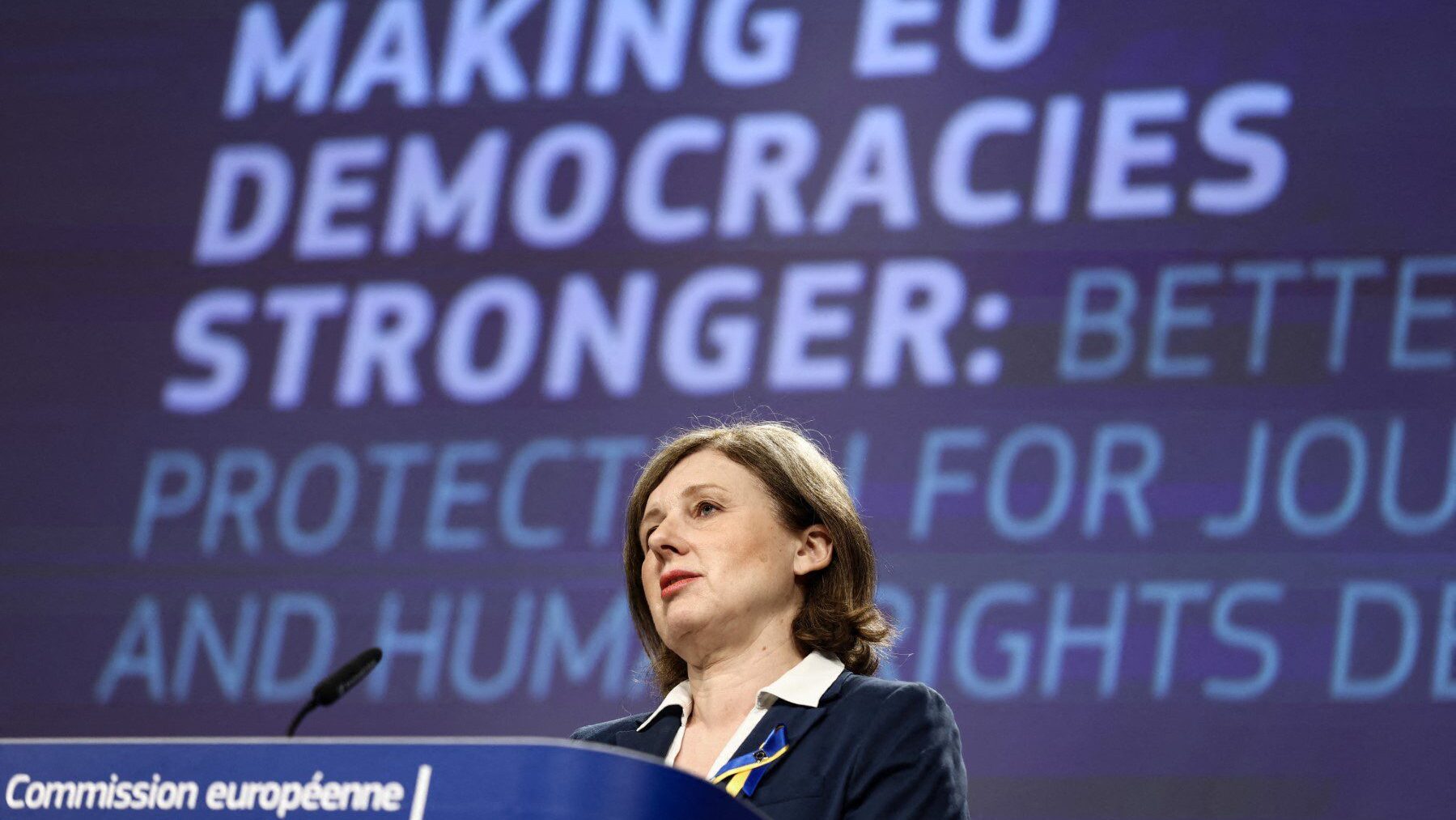
EU Commissioner for Values and Transparency, Věra Jourová.
Photo: Kenzo Tribouillard / AFP
Democracy is in danger from Russian proxies throughout the EU, Values and Transparency Commissioner Věra Jourová said, announcing that she’s embarking on a “democracy tour” of EU capitals to promote action against alleged Russian disinformation and what she refers to as Moscow’s “domestic proxies.”
In an interview published on Wednesday, February 28th, the commissioner claimed that many of Europe’s populist right-wing parties are in fact part of the Kremlin’s propaganda network and are actively spreading Russian disinformation among their supporters.
“The Kremlin directly cannot influence the minds and hearts of European people. They [sic] need domestic proxies,” Jourová said, adding that her “biggest concern” was the German Alternative für Deutschland (AfD).
It’s no surprise that AfD comes under heavy fire from the Brussels establishment. The party’s popularity has been at a record high for months, polling second only to the center-right CDU but ahead of the ruling socialists (SDP) and Greens.
“In case the AfD is very successful in the European elections, just the arithmetic says that it might create considerable change, so of course this is the source of concerns,” the commissioner said.
We see AfD taking over the Russian narratives and, honestly, this is for me the source of biggest concern, because if Germany turns its back against Ukraine and the … European Union, we will be in big, big trouble.
AfD is one of the parties in Europe that has most vocally decried the failure of the EU’s current Ukraine strategy of endless weapon deliveries and ineffective sanctions. The party has instead called for pursuing a ceasefire to avoid unnecessary deaths, as well as further escalation and economic strains.
This should not be a radical position. A recent study done by Europe’s largest foreign policy think tank, the ECFR, shows that 41% of Europeans think Ukraine should be forced to the negotiating table as opposed to only 31% who think the EU should continue its support indefinitely.
Yet, apparently, a plurality of Europeans are simply Russian proxies or have been brainwashed by Russian propaganda—at least that’s what Jourová seems to imply.
4/ Support for Ukraine is broad in Europe, though there are some countries where most would prefer to push Kyiv to accept a settlement. https://t.co/FIoLsJSaPK pic.twitter.com/xYG4pMIifm
— ECFR (@ecfr) February 21, 2024
The Commissioner said that she would visit Berlin as part of her tour sometime before the summer. She begins with a trip to Helsinki on Wednesday and continues by visiting Rome next week. There are a lot more capital visits planned between now and the June elections, but Germany will be among the last ones due to AfD’s potential to have a “big, big impact on the whole of Europe.”
According to Jourová, a vote for AfD is not just a vote for Putin but also against democracy itself—never mind the apparent contradiction; AfD is ‘undemocratic’ because she says so. “In the current context, democratic processes might give the blessing to the end of democracy.”
But AfD is not alone, the commissioner noted, saying that Russia has a specific strategy for every EU country. And while most of the parties she deems problematic are in opposition, two of them are spewing alleged “Russian narratives” from the government: Slovakia’s Smer-SD led by PM Robert Fico, and Hungary’s Fidesz with Prime Minister Viktor Orbán.
The problem is not only with politicians, Jourová added, but also with “alternative media” sources that are beginning to overtake mainstream media channels that are ‘safe’ from Russian disinformation. What she didn’t mention was the hundreds of millions worth of U.S.-government funds invested in “fact-checking” right-wing European media during the campaign period. According to Brussels’ logic, it’s not election interference if the Left or America does it.
Jourová said that there is one “especially powerful” Russian narrative spread by this alt-media. “It is a very short message: ‘We want peace,’” she said. “We all want peace. But it must not be appeasement. This ‘we want peace,’ coming from the Kremlin means ‘stop supporting Ukraine.’”
Needless to say, the pro-peace Right has its own well-articulated arguments, even if the Commission refuses to listen.
“It’s obvious—based on the fundamental, mathematical facts—that there is no solution on the battlefield,” PM Orbán said in an interview last Friday. The Hungarian PM explained that since NATO does not want to be involved (except for Macron, maybe), the current strategy is not only faulty but also inhumane.
No matter how much arms and equipment we give them, Ukraine cannot defeat Russia—unless the Western countries join the war with their own armies as well. However, NATO made it clear from the start that it won’t send troops to Ukraine. … And since that’s off the table, it’s obvious that we need to strive for a ceasefire and peace.
And this is no kid’s game. Hundreds of thousands die, and we talk about widows and orphans. There’s unbelievable destruction and loss of irreplaceable human life. This is a very heavy responsibility. … From a moral perspective too, the right choice is to recognize the realities: this conflict has no battlefield solution; we need a peace process to end it.
The #RussiaUkraineWar has been raging on in our immediate neighbourhood for two years. It’s time for peace! #ceasefire #peacetalks pic.twitter.com/dXYIabvc5t
— Orbán Viktor (@PM_ViktorOrban) February 24, 2024
